'People will forgive you for being wrong, but they will never forgive you for being right - especially if events prove you right while proving them wrong.' Thomas Sowell
Search This Blog
Showing posts with label surveillance. Show all posts
Showing posts with label surveillance. Show all posts
Wednesday, 27 October 2021
Wednesday, 28 July 2021
Tuesday, 20 July 2021
Monday, 11 May 2020
Rahul Gandhi is back. Now with two economists, a migrant aid pack and an ethical hacker
Zainab Sikandar in The Print

It takes a lot to be defeated twice over, ridiculed for years and still care enough to show up for your country, the majority of which has rejected you for a national leadership role. Rahul Gandhi continues to surprise us. He simply won’t give up. He just doesn’t turn cynical and walk away.
He keeps coming back with his empathy as well as his willingness to find viable solutions to pressing issues induced by the pandemic: an economy in doldrums, a huge migrant workers’ problem that’s slowly turned into a humanitarian crisis as well as transparency of the government’s Arogya Setu app being used to map Covid positive patients. Rahul Gandhi’s comeback is all the more conspicuous against the backdrop of Prime Minister Narendra Modi’s unwillingness to have a press conference
Rahul is ready to talk
Rahul Gandhi is the eternal unputdownable comeback kid. He has managed to hold the attention of the media by continuously participating in the process of finding answers to the problems that Covid has thrown at India. He has had two conversations with two economists par excellence, former RBI governor Raghuram Rajan and Nobel laureate Abhijit Banerjee. Add to this, the migrant aid pack that Sonia Gandhi offered, where the Congress party would have paid the train fare for every migrant labourer who wants to go home. This “masterstroke” has made the fiercest of critics of the Congress party applaud the Gandhis. The Gandhis are consciously and conspicuously placing themselves polar opposite to Narendra Modi. Whatever Modi is avoiding, the Gandhis are accepting and dealing squarely.
Right-wing editorials are claiming that Rahul Gandhi is trying to come off as an “intellectual”. This, for a man who till recently they caustically made fun of. But this perception is cracking because for the first time, the entire BJP PR machinery is being used to not make fun of Rahul Gandhi, but to discredit his interactions with the two economists by either calling the interaction a “repackaged Socialist snake oil” or by spinning fake news related to the guests. MoneyControl.com and News18 misquoted Abhijit Bannerjee as criticising UPA’s schemes, which the BJP had embraced. Banerjee had said no such thing.
Ending obsession with Modi
Then there’s Rahul Gandhi’s two press conferences (via Zoom). We got to see a visibly more calmer and zen Rahul Gandhi who is neither shaken nor stirred by the six-year-long vicious slander by the BJP or the media, which has more often than not dealt rather unfairly with him. He has significantly altered his behaviour from the Rahul of yore, who would either attack Modi with his ‘Chowkidar Chor hai’ jibe or give him a hug in Parliament and say that he loves the prime minister.
Rahul’s detachment from Modi is palpable when he urges the government to transfer direct cash to the poor, as envisaged in Congress’s NYAY scheme, by saying “Call it ‘nyay’ (justice) or call it by any other name but do it.”
Rahul, it appears, has specifically distanced himself from acts of political pettiness and his statements reflect a sense of political maturity: “We can defeat the virus if we fight it together, we lose if we fight with each other”. Even though he also unapologetically added that he does not agree with Prime Minister Narendra Modi on most things but wanted to offer “constructive suggestions”.
Gandhi’s well-directed tweets with suggestions to the government are now also being affirmed by experts.
Turning Aarogya to his advantage
While the BJP is in pathological denial of anything substantive that Rahul Gandhi or the two economists had to say, an ethical hacker had the government promptly take notice and admit to its mistake. French hacker Elliot Alderson on Twitter looked into the Aarogya Setu app and confirmed Rahul’s fear that it was nothing more than a “sophisticated surveillance system”. The app’s user agreement states that the data can be used in the future for purposes other than epidemic control if there is a legal requirement. The privacy policy of the app states that the data on the app may be shared with as many agencies as the government sees fit.
Alderson went on to confirm and tweeted to the government that “A security issue has been found in your app. The privacy of 90 million Indians is at stake.” He ended the tweet with a post script that read; “@Rahul Gandhi was right.”
Although the Modi government confirmed that there could be no security breach in the app, they thanked the ethical hacker on engaging with them. Alderson on the other hand has confirmed that some of the issues he reported were fixed in the app and that he did receive calls from the National Informatics Centre (NIC) and the Indian Computer Emergency Response Team (ICERT), both government bodies.
In fact the press note of Aarogya Setu thanked Alderson for engaging with them. “We thank the ethical hacker on engaging with us. We encourage any users who identify a vulnerability to inform us immediately.” Anderson, however, maintained that the app should “stop lying, stop denying”.
Rahul’s initial warning, as early as 12 February, foreboding the government of ignoring the contagion almost seems prophetic today. The BJP can go on to dismiss him but it’s getting harder for the party and the government to ignore Rahul in these Covid times.

It takes a lot to be defeated twice over, ridiculed for years and still care enough to show up for your country, the majority of which has rejected you for a national leadership role. Rahul Gandhi continues to surprise us. He simply won’t give up. He just doesn’t turn cynical and walk away.
He keeps coming back with his empathy as well as his willingness to find viable solutions to pressing issues induced by the pandemic: an economy in doldrums, a huge migrant workers’ problem that’s slowly turned into a humanitarian crisis as well as transparency of the government’s Arogya Setu app being used to map Covid positive patients. Rahul Gandhi’s comeback is all the more conspicuous against the backdrop of Prime Minister Narendra Modi’s unwillingness to have a press conference
Rahul is ready to talk
Rahul Gandhi is the eternal unputdownable comeback kid. He has managed to hold the attention of the media by continuously participating in the process of finding answers to the problems that Covid has thrown at India. He has had two conversations with two economists par excellence, former RBI governor Raghuram Rajan and Nobel laureate Abhijit Banerjee. Add to this, the migrant aid pack that Sonia Gandhi offered, where the Congress party would have paid the train fare for every migrant labourer who wants to go home. This “masterstroke” has made the fiercest of critics of the Congress party applaud the Gandhis. The Gandhis are consciously and conspicuously placing themselves polar opposite to Narendra Modi. Whatever Modi is avoiding, the Gandhis are accepting and dealing squarely.
Right-wing editorials are claiming that Rahul Gandhi is trying to come off as an “intellectual”. This, for a man who till recently they caustically made fun of. But this perception is cracking because for the first time, the entire BJP PR machinery is being used to not make fun of Rahul Gandhi, but to discredit his interactions with the two economists by either calling the interaction a “repackaged Socialist snake oil” or by spinning fake news related to the guests. MoneyControl.com and News18 misquoted Abhijit Bannerjee as criticising UPA’s schemes, which the BJP had embraced. Banerjee had said no such thing.
Ending obsession with Modi
Then there’s Rahul Gandhi’s two press conferences (via Zoom). We got to see a visibly more calmer and zen Rahul Gandhi who is neither shaken nor stirred by the six-year-long vicious slander by the BJP or the media, which has more often than not dealt rather unfairly with him. He has significantly altered his behaviour from the Rahul of yore, who would either attack Modi with his ‘Chowkidar Chor hai’ jibe or give him a hug in Parliament and say that he loves the prime minister.
Rahul’s detachment from Modi is palpable when he urges the government to transfer direct cash to the poor, as envisaged in Congress’s NYAY scheme, by saying “Call it ‘nyay’ (justice) or call it by any other name but do it.”
Rahul, it appears, has specifically distanced himself from acts of political pettiness and his statements reflect a sense of political maturity: “We can defeat the virus if we fight it together, we lose if we fight with each other”. Even though he also unapologetically added that he does not agree with Prime Minister Narendra Modi on most things but wanted to offer “constructive suggestions”.
Gandhi’s well-directed tweets with suggestions to the government are now also being affirmed by experts.
Turning Aarogya to his advantage
While the BJP is in pathological denial of anything substantive that Rahul Gandhi or the two economists had to say, an ethical hacker had the government promptly take notice and admit to its mistake. French hacker Elliot Alderson on Twitter looked into the Aarogya Setu app and confirmed Rahul’s fear that it was nothing more than a “sophisticated surveillance system”. The app’s user agreement states that the data can be used in the future for purposes other than epidemic control if there is a legal requirement. The privacy policy of the app states that the data on the app may be shared with as many agencies as the government sees fit.
Alderson went on to confirm and tweeted to the government that “A security issue has been found in your app. The privacy of 90 million Indians is at stake.” He ended the tweet with a post script that read; “@Rahul Gandhi was right.”
Although the Modi government confirmed that there could be no security breach in the app, they thanked the ethical hacker on engaging with them. Alderson on the other hand has confirmed that some of the issues he reported were fixed in the app and that he did receive calls from the National Informatics Centre (NIC) and the Indian Computer Emergency Response Team (ICERT), both government bodies.
In fact the press note of Aarogya Setu thanked Alderson for engaging with them. “We thank the ethical hacker on engaging with us. We encourage any users who identify a vulnerability to inform us immediately.” Anderson, however, maintained that the app should “stop lying, stop denying”.
Rahul’s initial warning, as early as 12 February, foreboding the government of ignoring the contagion almost seems prophetic today. The BJP can go on to dismiss him but it’s getting harder for the party and the government to ignore Rahul in these Covid times.
Sunday, 29 October 2017
From climate change to robots: what politicians aren’t telling us
Simon Kuper in The Financial Times
On US television news this autumn, wildfires and hurricanes have replaced terrorism and — mostly — even mass shootings as primetime content. Climate change is making natural disasters more frequent, and more Americans now live in at-risk areas. But meanwhile, Donald Trump argues on Twitter about what he supposedly said to a soldier’s widow. So far, Trump is dangerous less because of what he says (hot air) or does (little) than because of the issues he ignores.
On US television news this autumn, wildfires and hurricanes have replaced terrorism and — mostly — even mass shootings as primetime content. Climate change is making natural disasters more frequent, and more Americans now live in at-risk areas. But meanwhile, Donald Trump argues on Twitter about what he supposedly said to a soldier’s widow. So far, Trump is dangerous less because of what he says (hot air) or does (little) than because of the issues he ignores.
He’s not alone: politics in many western countries has become a displacement activity. Most politicians bang on about identity while ignoring automation, climate change and the imminent revolution in medicine. They talk more about the 1950s than the 2020s. This is partly because they want to distract voters from real problems, and partly because today’s politicians tend to be lawyers, entertainers and ex-journalists who know less about tech than the average 14-year-old. (Trump said in a sworn deposition in 2007 that he didn’t own a computer; his secretary sent his emails.) But the new forces are already transforming politics.
Ironically, given the volume of American climate denial, the US looks like becoming the first western country to be hit by climate change. Each new natural disaster will prompt political squabbles over whether Washington should bail out the stricken region. At-risk cities such as Miami and New Orleans will gradually lose appeal as the risks become uninsurable. If you buy an apartment on Miami Beach now, are you confident it will survive another 30 years undamaged? And who will want to buy it from you in 2047? Miami could fade as Detroit did.
American climate denial may fade too, as tech companies displace Big Oil as the country’s chief lobbyists. Already in the first half of this year, Amazon outspent Exxon and Walmart on lobbying. Facebook, now taking a kicking over fake news, will lobby its way back. Meanwhile, northern Europe, for some years at least, will benefit from its historical unique selling point: its mild and rainy climate. Its problem will be that millions of Africans will try to move there.
On the upside, many Africans will soon, for the first time ever, have access to energy (thanks to solar panels) and medical care (as apps monitor everything from blood pressure to sugar levels, and instantly prescribe treatment). But as Africa gets hotter, drier and overpopulated, people will struggle to feed themselves, says the United Nations University. So they will head north, in much greater numbers than Syrians have, becoming the new bogeymen for European populists. Patrolling robots — possibly with attack capabilities — will guard Fortress Europe.
Everywhere, automation will continue to eat low-skilled jobs. That will keep people angry. Carl Benedikt Frey of Oxford university’s Martin School recalls workers smashing up machines during the British industrial revolution, and says: “There was a machinery riot last year: it was the US presidential election.” American workers hit by automation overwhelmingly voted Trump, even though he doesn’t talk about robots.
Soon, working-class men will lose driving jobs to autonomous vehicles. They could find new jobs servicing rich people as cleaners (a profession that’s surprisingly hard to automate), carers or yoga teachers. Young men will develop new notions of masculinity and embrace this traditionally feminine work. But older working-class men will probably embrace politicians like Trump.
The most coveted good of all — years of life — will become even more unfairly distributed. The lifespans of poor westerners will continue to stagnate or shorten, following the worldwide surge in obesity since the 1980s. Many poorer people will work into their seventies, then die, skipping the now standard phase of retirement. Meanwhile, from the 2020s the rich will live ever longer as they start buying precision medicine. They will fix their faulty DNA and edit their embryos, predicts Vivek Wadhwa, thinker on technology. (I heard him and Frey at this month’s excellent Khazanah Megatrends Forum in Malaysia.) Even if governments want to redress inequality, they won’t be able to, given that paying tax has become almost voluntary for global companies.
The country hit hardest by automation could be China (though Germany could suffer too, especially if its carmakers fail to transform). China’s model of exploiting cheap factory labour without environmental regulations has run its course, says Wadhwa. “I don’t think we need Chinese robots.” Even if China’s economy keeps growing, low-skilled men won’t find appealing careers, and they won’t even have the option of electing a pretend system-smasher like Trump. The most likely outcome: China’s regime joins the populist trend and runs with aggressive nationalism.
Troubled regimes will also ratchet up surveillance. Now they merely know what you say. In 10 years, thanks to your devices, they will know your next move even before you do. Already, satellites are monitoring Egypt’s wheat fields, so as to predict the harvest, which predicts the chance of social strife. Meanwhile, western politicians will probably keep obsessing over newsy identity issues. My prediction for the 2020s: moral panics over virtual-reality sex.
Tuesday, 19 November 2013
Police are cracking down on students
Police are cracking down on students – but what threat to law and order is an over-articulate history graduate?
For most of my life student politics has been little more than a joke. Suddenly it's become both serious and admirable
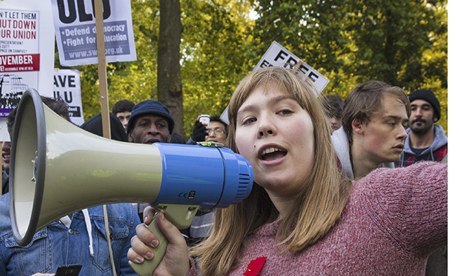
A protester against the proposed closure of the ULU student union last week. Photograph: Paul Davey/Demotix/Corbis
Why are some of the most powerful people in Britain so terrified of a bunch of students? If that sounds a ridiculous question, consider a few recent news stories. As reported in this paper last week, Cambridge police are looking for spies to inform on undergraduate protests against spending cuts and other "student-union type stuff". Meanwhile, in London last Thursday, a student union leader, Michael Chessum, was arrested after a small and routine demo. Officers hauled him off to Holborn police station for not informing them of the precise route of the protest – even though it was on campus.
The 24-year-old has since been freed – on the strict condition that he doesn't "engage in protest on any University Campus and not within half a mile boundary of any university". Even with a copy of the bail grant in front of me, I cannot make out whether that applies to any London college, any British university – or just any institute of higher education anywhere in the world. As full-time head of the University of London's student union, Chessum's job is partly to protest: the police are blocking him from doing his work. But I suppose there's no telling just what threat to law and order might be posed by an over-articulate history graduate.
While we're trawling for the ridiculous, let us remember another incident this summer at the University of London, when a 25-year-old woman was arrested for the crime of chalking a slogan on a wall. That's right: dragged off by the police for writing in water-soluble chalk. Presumably, there would have been no bother had she used PowerPoint.
It all sounds farcical – it is farcical – until you delve into the details. Take the London demo that landed Chessum in such bother: university staff were filming their own students from a balcony of Senate House (the building that inspired the Ministry of Truth in Orwell's Nineteen Eighty-Four, appropriately enough). Such surveillance is a recent tradition, the nice man in the University press office explains to me – and if the police wanted the footage that would be no problem.
That link with the police is becoming increasingly important across more and more of our universities. London students allege that officers and university security guards co-ordinate their attempts to rein in demonstrations while staff comment on the increased police presence around campus. At Sussex, student protests against outsourcing services were broken up this April, when the university called in the police – who duly turned up with riot vans and dogs. A similar thing happened at Royal Holloway university, Surrey in 2011: a small number of students occupied one measly corridor to demonstrate against course closures and redundancies; the management barely bothered to negotiate, but cited "health and safety" and called in the police to clear away the young people paying their salaries.
For most of my life, student politics has been little more than a joke – the stuff of Neil off the Young Ones, or apprentice Blairites. But in the past few years it has suddenly become both serious and admirable, most notably with the protests of 2010 against £9,000 tuition fees and the university occupations that followed. And at just that point, both the police and university management have become very jumpy.
For the police, this is part of the age-old work of clamping down on possible sources of civil disobedience. But the motivation for the universities is much more complicated. Their historic role has been to foster intellectual inquiry and host debate. Yet in the brave new market of higher education, when universities are competing with each other to be both conveyor belts to the jobs market and vehicles for private investment, such dissent is not only awkward – it's dangerously uncommercial. As Andrew McGettigan, author of The Great University Gamble, puts it: "Anything too disruptive gets in the way of the business plan."
Last month it appeared that Edinburgh University had forced its student union to sign a gagging clause (now withdrawn). No union officer is allowed to make any public criticism of the university without giving at least 48 hours' notice. University managers reportedly made that a deal-breaker if the student union was to get any funds.
The managers of the University of London want to shut down the student union at the end of this academic year. The plan – which is why Chessum and co were marching last week – is to keep the swimming pool and the various sports clubs, but to quash all university-wide student representation. After all, the students are only the people paying the salary of the university vice-chancellor, Adrian Smith – why should they get a say? The plan, it may not surprise you to learn, was drawn up by a panel that didn't number a single student. What with sky-high fees and rocketing rents in the capital, you might think that the need for a pan-London student body had never been higher. But then, you're not a university manager on a six-figure salary.
Where universities were historically places of free expression, now they are having to sacrifice that role for the sake of the free market. For students, that comes in the form of a crackdown on dissent. Yet the twentysomethings at university now will end up running our politics, our businesses and our media. You might want these future leaders to be questioning and concerned about society. Or you might wonder whether sending in the police to arrest a woman chalking a wall is proportionate. Either way, you should be troubled.
Tuesday, 15 October 2013
From Obamacare to trade, superversion not subversion is the new and very real threat to the state
Rightwing politicians and their press use talk of patriotism to disguise where their true loyalty lies: the wealthy elite
BETA
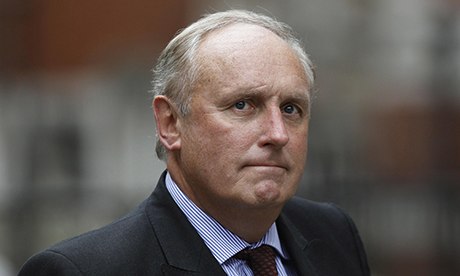
Daily Mail editor Paul Dacre. 'Strangely, this suspicion of the state and the People Who Know Best does not appear to extend to the security services, whose assault on our freedoms Dacre was defending'. Photograph: Suzanne Plunkett/Reuters
Subversion ain't what it used to be. Today it scarcely figures as a significant force. Nation states are threatened by something else. Superversion: an attack from above.
It takes several forms. One is familiar, but greatly enhanced by new technology: the tendency of spooks and politicians to use the instruments of state to amplify undemocratic powers. We've now learnt that even members of the cabinet and the National Security Council had no idea what GCHQ was up to. No one told them that it was developing the capacity to watch, if it chooses, everything we do online. The real enemies of state (if by state we mean the compact between citizens and those they elect) are people like the head of MI5, and the home secretary, who seem to have failed to inform cabinet colleagues about these programmes.
Allied to the old abuses is a newer kind of superversion: the attempts by billionaires and their lieutenants to destroy the functions of the state. Note the current shutdown – and the debt-ceiling confrontation scheduled for Thursday – in the United States. The Republicans, propelled by a Tea Party movement created by the Koch brothers and financed by a gruesome collection of multimillionaires, have engineered what in other circumstances would be called a general strike. The difference is that the withdrawal of their labour has been imposed on the workers.
The narrow purpose of the strike is to prevent the distribution of wealth to poorer people, through the Affordable Care Act. The wider purpose (aside from a refusal to accept the legitimacy of a black president) is to topple the state as an effective instrument of taxation, regulation and social protection. The Koch shock troops in the Republican party seem prepared to inflict almost any damage in pursuit of this insurgency, including – if they hold out on Thursday – a US government default, which could trigger a new global financial crisis.
They do so on behalf of a class which has, in effect, seceded. It floats free of tax and the usual bonds of citizenship, jetting from one jurisdiction to another as it seeks the most favourable havens for its wealth. It removes itself so thoroughly from the life of the nation that it scarcely uses even the roads. Yet, through privatisation and outsourcing, it is capturing the public services on which the rest of us depend.
Using an unreformed political funding system to devastating effect, this superversive class demands that the state stop regulating, stop protecting, stop intervening. When this abandonment causes financial crisis, the remaining taxpayers are forced to bail out the authors of the disaster, who then stash their bonuses offshore.
One result is that those who call themselves conservatives and patriots appear to be deeply confused about what they are defending. In his article last week attacking the Guardian for revealing GCHQ's secret surveillance programmes, Paul Dacre, the editor of the Daily Mail, characterised his readers as possessing an "over-riding suspicion of the state and the People Who Know Best". Strangely, this suspicion of the state and the People Who Know Best does not appear to extend to the security services, whose assault on our freedoms Dacre was defending.
To the rightwing press and the Conservative party, patriotism means standing up to the European Union. But it also means capitulating to the United States. It's an obvious and glaring contradiction, which is almost never acknowledged, let alone explained. In reality the EU and the US have become proxies for something which transcends national boundaries. The EU stands for state control and regulation while the US represents deregulation and atomisation.
In truth, this distinction is outdated, as the handful of people who have heard of the Transatlantic Trade and Investment Partnership (TTIP) will appreciate. The European commission calls it "the biggest trade deal in the world". Its purpose is to create a single transatlantic market, in which all regulatory differences between the US and the EU are gradually removed.
It has been negotiated largely in secret. This time, they're not just trying to bring down international trade barriers, but, as the commission boasts, "to tackle barriers behind the customs border – such as differences in technical regulations, standards and approval procedures". In other words, our own laws, affecting our own people.
A document published last year by two huge industrial lobby groups – the US Chamber of Commerce and BusinessEurope – explains the partnership's aims. It will have a "proactive requirement", directing governments to change their laws. The partnership should "put stakeholders at the table with regulators to essentially co-write regulation". Stakeholder is a euphemism for corporation.
They want it; they're getting it. New intellectual property laws that they have long demanded, but which sovereign governments have so far resisted – not least because of the mass mobilisation against the Stop Online Piracy Act and Protect IP Act in the US – are back on the table, but this time largely inaccessible to public protest.
So are data protection, public procurement and financial services. You think that getting your own government to regulate bankers is hard enough? Try appealing to a transnational agreement brokered by corporations and justified by the deemed consent of citizens who have been neither informed nor consulted.
This deal is a direct assault on sovereignty and democracy. So where are the Daily Mail and the Telegraph and the other papers which have campaigned so hard against all transfers of power to the European Union? Where are the Conservative MPs who have fought for an EU referendum? Eerie silence descends. They do not oppose the TTIP because their allegiance lies not with the nation but with the offshored corporate elite.
These fake patriots proclaim a love for their country, while ensuring that there is nothing left to love. They are loyal to the pageantry – the flags, the coinage, the military parades – but intensely disloyal to the nation these symbols are supposed to represent. The greater the dissonance becomes, the louder the national anthem plays.
Sunday, 1 September 2013
Obama is all about 'universal rights' - except for Muslims
It's time the president acknowledges that systematized discrimination against Muslims is real and thriving
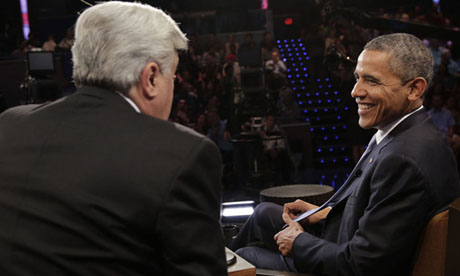
Jay Leno talks with President Barack Obama during a commercial break on 6 August 2013. Photograph: Paul Drinkwater/NBC/Getty Images
I was watching President Obama employ his devilish charisma, in routine fashion, on The Tonight Show with Jay Leno in early August. The banter dissipated as the interview took a more serious turn to embassy closures, Edward Snowden and, finally, Russia. Obama condemned President Vladimir Putin for Russia's recent "homosexual propaganda" bill saying:
"When it comes to universal rights, when it comes to people's basic freedoms, whether you are discriminating on the basis of race, religion, gender or sexual orientation, you are violating the basic morality that should transcend every country."
I was left rattled by the president's statement. Obama, who made history last year whenhe expressed his support for same-sex marriage, was comfortably unabashed in impugning Russian leadership on the reprehensible policy, as he should have been. But as a Muslim American, neither the irony nor the hypocrisy of his statement, championing "universal rights", was lost on me.
"When it comes to universal rights, when it comes to people's basic freedoms, whether you are discriminating on the basis of race, religion, gender or sexual orientation, you are violating the basic morality that should transcend every country."
I was left rattled by the president's statement. Obama, who made history last year whenhe expressed his support for same-sex marriage, was comfortably unabashed in impugning Russian leadership on the reprehensible policy, as he should have been. But as a Muslim American, neither the irony nor the hypocrisy of his statement, championing "universal rights", was lost on me.
As we've witnessed time and time again domestically, most recently with the Associated Press revelation that the NYPD designated Muslim houses of worship and community centers as terrorist organizations, the United States is no stranger to legalizing discrimination. In the elusive pursuit of true equality, President Obama has made considerable and long overdue progress in securing the rights of the LGBT community. But he in no way can tout the badge of "basic morality" until he acknowledges that many Americans are being confronted with institutionalized discrimination in every tier of the government hierarchy. Racism, Islamophobia and prejudice run amok in our society, but when discriminatory practice is etched into law, it harkens back to a sinister time in our nation's history.
Regrettably, branding mosques as terrorist enterprises doesn't exactly move the needle given the NYPD's history of targeted surveillance and monitoring of the region's Muslim community. Invidious policy and religious profiling are not confined to the NYPD either. This is just the latest in a mounting string of offenses by government agencies against Muslim Americans. The FBI maintains an intimidatingly lengthy catalog of 15,000 spies, three times as many as there were 25 years ago. In a post 9/11 climate many of them operate as informants in mosques throughout the nation. The mosque that I grew up attending in Irvine, California, was infiltrated by one such informant, who worked so hard to plant seeds of violence and terrorism in the minds of its congregants that members of the mosque immediately reported him.
"Geo-mapping", the FBI's purported tactical crime fighting tool, was exposed as a covert mapping program to track and monitor Muslim communities engaging in constitutionally protected activity, without any suspicion of crime. Leaked FBI training materials have also cemented what we already know – the agency religiously profiles Muslims,instructing its agents that "mainstream" Muslims are terrorist sympathizers and the Muslim practice of giving charity is a cover for funding "combat".
It doesn't end there. Seven states have passed anti-Shariah legislation, redundant and extraneous laws that explicitly prohibit the use of foreign law in American courts, as already established by our nation's constitution. The bills passed in these states, most recently North Carolina, alienate the Muslim community and unfairly paint them as adherents of an archaic, anti-Western system, playing up longstanding stereotypes and stoking fears. Open-ended guidelines for Homeland Security initiatives, like the Suspicious Activity Reporting program, give credence to the subjective biases of citizens and law enforcement alike, allowing for religious profiling when dubbing something as "suspicious". And that is apart from the FBI Watch List and the TSA's No-Fly List.
TSA memos have indicated that their passenger screening process includes "things passengers might do which also might be things a terrorist would do, eg, pray to Allah right before the flight that you might have 90 virgins in heaven". Needless to say, many of these counter-terrorism measures disproportionately target Muslims. We see this disparity even in federal prison, where Muslims make up only 6% of the general federal prison population, but comprise two thirds of the inmates in Communication Management Units (CMU), prison units furtively created to isolate certain prisoners.
And all the while, the president has remained unnervingly silent.
I shouldn't have to point to statistics that most informants actually acted as agent provocateurs in terrorism probes. I also shouldn't have to cite that there is a dearth of evidence to prove that these national security measures, like the SAR program, are effective in combatting terrorism. I shouldn't have to clarify that there is no specter of Shariah law looming on the horizon and that Muslims are not looking to prop up a crescent and star flag in state capitols. And I've come undone at the thought of having to explain, again, that the overwhelming majority of Muslims being spied on, monitored, tracked and, in the case of 16 year old US citizen Abdulrahman Awlaki, killed – by federal, state and local agencies- are innocent of any wrongdoing.
My father's Islamic name should not place him on a watch list. When I pray in the airport, I should expect law enforcement to protect my right to do so, not jot notes in a security memo. And I should be able to attend my mosque without fear of reprisal, from anti-Muslim bigots and FBI spies alike. Being Muslim does not make me a criminal. I shouldn't have to say it, but secret measures that profile Muslims and veiled discriminatory policies assume as much.
This is not a "new low for the NYPD"; it's a dangerous manifestation of a foregone conclusion: in the name of national security, the civil rights afforded to Muslim Americans are being deliberately curtailed. It's time that the president acknowledges that systematized discrimination against Muslims is real and thriving, and expands the reach of his advocacy for universal human rights to include Muslim Americans.
Dark moments of institutionalized racism, alienation and ostracism besmirch this nation's history. It is all too coincidental that we recently marked the 50th anniversary of Martin Luther King Jr's legendary "I have a dream" speech – the impetus that led the FBI to surreptitiously launch one of the biggest surveillance operations in history – spying on Dr King himself. The idea that the government was looking for dirt on Dr King to discredit and destroy him seems ludicrous and offensive today. Here's hoping the president sees the historical irony.
Wednesday, 21 August 2013
So the innocent have nothing to fear?
After David Miranda we now know where this leads
The destructive power of state snooping is on display for all to see. The press must not yield to this intimidation
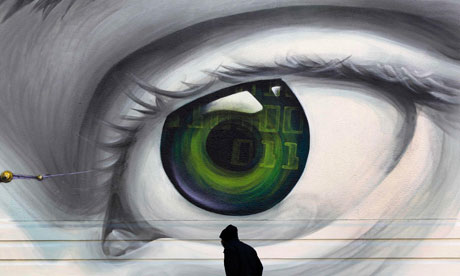
'But it remains worrying that many otherwise liberal-minded Britons seem reluctant to take seriously the abuses revealed in the nature and growth of state surveillance.' Photograph: Yannis Behrakis/Reuters
You've had your fun: now we want the stuff back. With these words the British government embarked on the most bizarre act of state censorship of the internet age. In a Guardian basement, officials from GCHQ gazed with satisfaction on a pile of mangled hard drives like so many book burners sent by the Spanish Inquisition. They were unmoved by the fact that copies of the drives were lodged round the globe. They wanted their symbolic auto-da-fe. Had the Guardian refused this ritual they said they would have obtained a search and destroy order from a compliant British court.
Two great forces are now in fierce but unresolved contention. The material revealed by Edward Snowden through the Guardian and the Washington Post is of a wholly different order from WikiLeaks and other recent whistle-blowing incidents. It indicates not just that the modern state is gathering, storing and processing for its own ends electronic communication from around the world; far more serious, it reveals that this power has so corrupted those wielding it as to put them beyond effective democratic control. It was not the scope of NSA surveillance that led to Snowden's defection. It was hearing his boss lie to Congress about it for hours on end.
Last week in Washington, Congressional investigators discovered that the America's foreign intelligence surveillance court, a body set up specifically to oversee the NSA, had itself been defied by the agency "thousands of times". It was victim to "a culture of misinformation" as orders to destroy intercepts, emails and files were simply disregarded; an intelligence community that seems neither intelligent nor a community commanding a global empire that could suborn the world's largest corporations, draw up targets for drone assassination, blackmail US Muslims into becoming spies and haul passengers off planes.
Yet like all empires, this one has bred its own antibodies. The American (or Anglo-American?) surveillance industry has grown so big by exploiting laws to combat terrorism that it is as impossible to manage internally as it is to control externally. It cannot sustain its own security. Some two million people were reported to have had access to the WikiLeaks material disseminated by Bradley Manning from his Baghdad cell. Snowden himself was a mere employee of a subcontractor to the NSA, yet had full access to its data. The thousands, millions, billions of messages now being devoured daily by US data storage centres may be beyond the dreams of Space Odyssey's HAL 9000. But even HAL proved vulnerable to human morality. Manning and Snowden cannot have been the only US officials to have pondered blowing a whistle on data abuse. There must be hundreds more waiting in the wings – and always will be.
There is clearly a case for prior censorship of some matters of national security. A state secret once revealed cannot be later rectified by a mere denial. Yet the parliamentary and legal institutions for deciding these secrets are plainly no longer fit for purpose. They are treated by the services they supposedly supervise with falsehoods and contempt. In America, the constitution protects the press from pre-publication censorship, leaving those who reveal state secrets to the mercy of the courts and the judgment of public debate – hence the Putinesque treatment of Manning and Snowden. But at least Congress has put the US director of national intelligence, James Clapper, under severe pressure. Even President Barack Obama has welcomed the debate and accepted that the Patriot Act may need revision.
In Britain, there has been no such response. GCHQ could boast to its American counterpart of its "light oversight regime compared to the US". Parliamentary and legal control is a charade, a patsy of the secrecy lobby. The press, normally robust in its treatment of politicians, seems cowed by a regime of informal notification of "defence sensitivity". This D-Notice system used to be confined to cases where the police felt lives to be at risk in current operations. In the case of Snowden the D-Notice has been used to warn editors off publishing material potentially embarrassing to politicians and the security services under the spurious claim that it "might give comfort to terrorists".
Most of the British press (though not the BBC, to its credit) has clearly felt inhibited. As with the "deterrent" smashing of Guardian hard drives and the harassing of David Miranda at Heathrow, a regime of prior restraint has been instigated in Britain whose apparent purpose seems to be simply to show off the security services as macho to their American friends.
Those who question the primacy of the "mainstream" media in the digital age should note that it has been two traditional newspapers, in London and Washington, that have researched, co-ordinated and edited the Snowden revelations. They have even held back material that the NSA and GCHQ had proved unable to protect. No blog, Twitter or Facebook campaign has the resources or the clout to confront the power of the state.
There is no conceivable way copies of the Snowden revelations seized this week at Heathrow could aid terrorism or "threaten the security of the British state" – as charged today by Mark Pritchard, an MP on the parliamentary committee on national security strategy. When the supposed monitors of the secret services merely parrot their jargon against press freedom, we should know this regime is not up to its job.
The war between state power and those holding it to account needs constant refreshment. As Snowden shows, the whistleblowers and hacktivists can win the occasional skirmish. But it remains worrying that many otherwise liberal-minded Britons seem reluctant to take seriously the abuses revealed in the nature and growth of state surveillance. The arrogance of this abuse is now widespread. The same police force that harassed Miranda for nine hours at Heathrow is the one recently revealed as using surveillance to blackmail Lawrence family supporters and draw up lists of trouble-makers to hand over to private contractors. We can see where this leads.
I hesitate to draw parallels with history, but I wonder how those now running the surveillance state – and their appeasers – would have behaved under the totalitarian regimes of the 20th century. We hear today so many phrases we have heard before. The innocent have nothing to fear. Our critics merely comfort the enemy. You cannot be too safe. Loyalty is all. As one official said in wielding his legal stick over the Guardian: "You have had your debate. There's no need to write any more."
Yes, there bloody well is.
Wednesday, 3 July 2013
NSA spying revelations: why so many are keen to play down the debate
The mass surveillance that Edward Snowden has exposed asks questions not only of government but of telecoms companies too
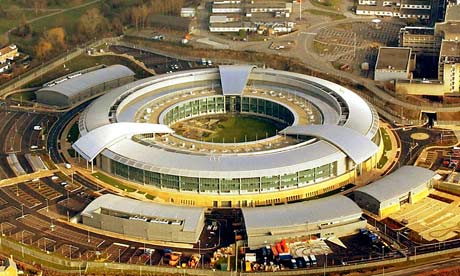
GCHQ reportedly snooped on foreign politicians attending two G20 summit meetings in London in 2009. Photograph: Barry Batchelor/PA
Covering the Edward Snowden story has not been straightforward for many in the mainstream media, which is reflected in the disjointed coverage it has received in the UK so far. For the newspapers that campaigned so hard to get the communications data bill thrown out because of the implications for privacy, he should be a hero. But then the brash young American "stole" the material, came to the Guardian with it, and has ended up stranded in Russia, where he may or may not receive asylum with the help of Julian Assange. All of which makes him rather unpalatable to many in Fleet Street – and indeed the House of Commons. For many of them, the easier story to tell was the one about Snowden's girlfriend, who was left bereft in Hawaii.
This week there have been more revelations about the way the US spied on the EU, which followed the Guardian's disclosures about how the British snooped on diplomats from Turkey and South Africa, among others, at the G20 summit in London four years ago. This has caused genuine fury among those targeted, particularly the Germans and the French. But their anger has been met with shoulder-shrugging indignation from former British diplomats and security experts, who say this sort of thing happens all the time.
They would hardly say anything different. In all likelihood, they have either authorised or benefited from such covert intelligence gathering, so the lack of biting analysis was entirely predictable. For those in the media unsure how to deal with Snowden, and rather hoping the complex saga would go away, this was another easy escape route: "No story here, let's move on."
But there is a story. It gets lost, all too conveniently, in the diplomatic rows and the character-assassinations, but ultimately it is the legacy of the Snowden files. The documents have shown that intelligence agencies in the UK and the US are harvesting vast amounts of information about millions of people. This is fact, not fantasy. They are doing this right now, on a scale that could not have been envisaged five years ago, let alone when the laws covering the collection and retention of data were drafted. They are also sharing this treasure trove of intelligence with each other, and other close allies.
In the UK, the same ministers who sign off operations to spy on our allies, are also approving countless warrants to allow GCHQ to siphon off data from cables that carry internet traffic in and out of the country. Emails, conversations on Skype, the details of phone calls – they all go into the intelligence pot ready for analysis and digestion.
The methods that GCHQ has developed may be ingenious. But are they right? Do the laws really legitimise this activity? And can the handful of MPs and commissioners tasked with the scrutinising the agencies really keep on top of all this? Do they have the staff, the expertise? Those are the questions that need proper argument. The reassurances of senior cabinet ministers, such as William Hague, who is responsible for GCHQ, needed to be tested, not just repeated unchallenged.
Those who wail about the leaks affecting national security might consider the words of Bruce Schneier, a security specialist, who wrote in the New York Times: "The argument that exposing these documents helps the terrorists doesn't even pass the laugh test; there's nothing here that changes anything any potential terrorist would do or not do."
And where are the telecoms companies in all this, and the internet service providers? For now, they are still keeping quiet. But at some point they will be asked to explain to their millions of customers what they knew about this industrial-scale snooping. None of this is easy, and ministers and intelligence officials would like nothing more than to shut down the debate. The clues are in their discomfort.
Tuesday, 2 July 2013
The subversive world of online drug dealing
Encrypted websites selling illegal drugs may render prohibition obsolete, but their profit-driven nature could be just as harmful

Drugs … 'there will always be a market'. Photograph: Anthony Bolante/Reuters
A nameless admin at Atlantis, a website selling everything from magic mushrooms to marijuana to crack cocaine, posted an advert on YouTube last week. The video was swiftly taken down, but not before about 40,000 people had seen it, copied down the strange URL and gone off to investigate. It's part of a bold new marketing campaign to allow people to easily buy illegal drugs, wherever they are in the world. Whether that's a good or bad thing is debatable.
Atlantis is a competitor to the Silk Road, an underground online market where drugs are bought and sold openly, sent to users under plain wrap in the mail. But where the Silk Road hides and does not share its URL very widely, Atlantis is shockingly blatant and comes over like a cocky web start-up. It is paying dividends: the site's owners claim to have processed half a million dollars in deals since March. There are allegations that it is a honeypot, drawing in ex-Silk Road vendors by charging lower fees, and offering proprietary encryption, rather than demanding that users learn PGP software (Pretty Good Privacy). This means the site's owners might be able to see where dealers on the site are sending drugs to, and identify customers, or listen in on email conversations and begin to expose dealers. Might the DEA have set up a bogus site to ensnare the unwary?
While nothing any government does around privacy should surprise us nowadays, from indiscriminately recording our every thought and whim, to spying on the grieving parents of murdered children with the aim of smearing their characters, the emergence of Atlantis and sites like it into the mainstream does raise the interesting prospect of a new war on encryption. Encryption software, most commonly PGP, scrambles your mail, making it impossible for a third party who does not own two special "keys" to read your mail.
Now the Prism and Tempora cats are out of the bag, and it's dawned on almost everyone what fools they've been, I'd guess that governments will soon be very keen to control encryption and will use the drug problem as a straw man defence for their next wave of intrusion. Note to government, it didn't work last time. To quote John Callas, who helped invent PGP with Phil Zimmerman: "PGP is just math, and you can't ban math."
In the UK, though, encryption can be a de facto crime under the Regulation of Investigatory Powers Act (Ripa), the Labour-era assault on civil liberties. Refuse to hand over the private keys to your private files and you can and will be jailed. IT website The Register reported in 2009 that the first person jailed under part three of Ripa was "a schizophrenic science hobbyist with no criminal record". Found with a model rocket as he returned from Paris, he refused to give police the keys to his encrypted data: indeed, he refused to speak at all, and was jailed for 13 months. Six months into his sentence the man was sectioned under the Mental Health Act and does not know when he will be released.
It's pretty easy to see what the initial official response to sites such as Atlantis will be. There'll be a concerted media campaign to scare people off. A few big busts of users, plus an attempted and likely very public assault on Bitcoin, the anonymous currency used to pay for the drugs.
But Bitcoin is essentially unassailable, because the currency has no central bank, and is made and maintained by a network of users. There's now enough of it in circulation to become a closed and private economy. Bitcoin is divisible into eight decimal places – 0.00000001 BTC is the smallest amount that can be handled in a transaction – so there's plenty of spare capacity. Perhaps an attack on Tor might work? Tor is the anonymising software that enables these markets to be hosted and accessed secretly. To quote Andrew Lewman, the Tor project's spokesman:
"Our code is all open source, everything we do is open source, and is mirrored all over the world. So even if, for whatever reason, let's say the paedophile-terrorist-druglords and the four horsemen of the apocalypse take over Tor and that's the majority usage, then the current Tor network could shut down, and just like a phoenix it will get born again. Then maybe we'll have 10 or 1,200 Tor networks because everyone starts running their own."
The only way to tackle online markets such as this is to make postal procedures hugely onerous. But that costs. The Royal Mail is about to be privatised and no one wants to invest. With 96% of its staff supporting a strike and opposing privatisation, it's hard to see workers agreeing to new requirements to scan every piece of post for drugs. In any case, queues in understaffed offices are so lengthy and the entire process of posting a letter so redolent of the frustrating world before the net there would be a customer revolt.
And there's no way sniffer dogs can tackle the circa 70m pieces of just domestic post at the sorting offices each day. When I was researching my book on the internet drugs trade, the Royal Mail refused to answer even the simplest questions about steps taken to identify packages containing drugs. The reason for that, postmen have told me privately, is that there are none. There's a new Russian anonymous market, that has just come online too. There will be many more, since prohibition makes their operation profitable and their use logical.
Free market economics, whose rules of supply and demand we so conspicuously ignore in this vast sector of the economy, make simple herbs and plant extracts or simply produced chemicals worth many millions of pounds per tonne. And so there will always be a market. That market has now been virtualised: Drugs 2.0 – click here to buy now.
But while I smile in disbelief at the defiance and subversion of sites like Silk Road and Atlantis, I can't help thinking that this cavalier dismantling of the failed and discredited prohibition model, replacing it with another system driven by private profit with no regard to people's health, risks exposing people to similar harms as prohibition did. Note past tense.
Subscribe to:
Comments (Atom)





